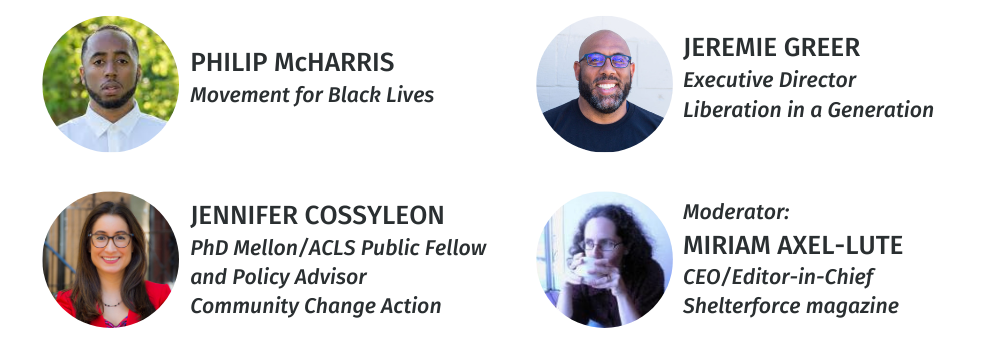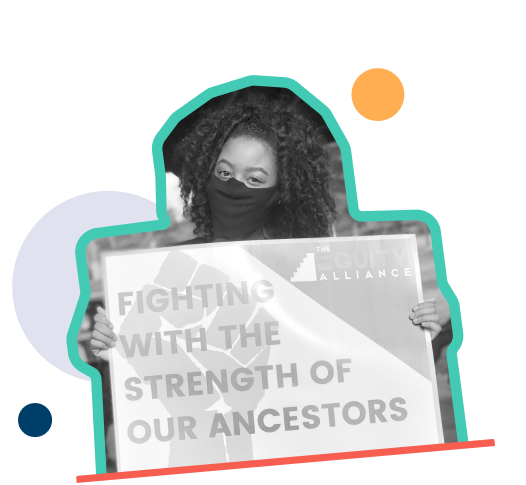A vital discussion of how the Housing Policy Playbook & the BREATHE Act can inform federal housing policy and what the Biden-Harris administration & philanthropy can do in the short and long term to reinvigorate housing justice.
Presented by Shelterforce, Funders Together to End Homelessness, and Neighborhood Funders Group

Earlier this year, the Housing Playbook Project released the New Deal for Housing Justice — a set of policy recommendations to help solve the U.S. housing crisis, which has been made worse by the pandemic. Designed by those who’ve experienced housing insecurity or homelessness, grassroots housing leaders, and policy experts, the New Deal for Housing Justice lays out a set of critical actions for the new administration and Congress.
The BREATHE Act, a project of the Movement for Black Lives’ 501(c)4 Electoral Justice Project, offers a radical reimagining of public safety and community care. The bill advocates for divesting federal resources from incarceration and policing to invest in new, non-punitive, non-carceral approaches to community safety shrinks state criminal-legal systems and center the protection of Black lives. This includes allocating new money to build healthy, sustainable, and equitable communities — as well as holding political leaders to their promises and enhance the self-determination of all Black communities.
Grassroots leaders and advocates call on Congress, the Biden-Harris administration, and philanthropy to:
-
Deliver a COVID-19 relief package to remedy the housing insecurity of people of color;
-
Create a refundable renter’s tax credit to provide relief to cost-burdened renters;
-
Establish a Presidential Commission on Reparations to Black people for a legacy of anti-Black federal housing policy;
-
Expand access to Housing Choice Vouchers so that millions of low-income families can access the benefit;
-
Set a new vision for ending and preventing homelessness and develop partnerships to avoid it;
-
Increase the supply of public and subsidized housing and eliminate the backlog of repairs in existing public and subsidized housing;
-
Research and pilot a universal basic income program that allows people to afford quality housing.
-
Establish a competitive Housing & Infrastructure Grant Program that incentivizes jurisdictions to make specified equity-focused policy changes and provide resources for programs and investments around improving access to and the quality of affordable housing.
-
Support the development of Community Land Trusts and create tax-relief programs to help individuals who are facing potential displacement as the result of rapidly increasing home values due to gentrification.
-
Invest in a program that provides assistance with home ownership costs, specifically for households that rent or live in historically redlined communities.
America is ready for a national conversation and action on housing. People nationwide see a clear role for the government to provide solutions and policies that assure that all of us have a place to call home.
The ongoing impacts of the pandemic and economic downturn, combined with amplified calls for racial justice, further underscore the need to prioritize housing justice. Home is essential, but for far too many people a safe, stable, healthy home is completely out of reach. Join us to discuss the issues and learn how philanthropy can support organizers working to create access to home for all communities.
Welcome:
- Faron McLurkin, Vice President of Programs, Neighborhood Funders Group
- Amy Kenyon, Program Officer, Ford Foundation
Speakers:

-
Jeremie Greer, Executive Director, Liberation in a Generation, contributing author to Housing Policy Playbook
-
Philip McHarris, Movement for Black Lives, discussing the BREATHE Act
-
Jennifer Cossyleon, PhD Mellon/ACLS Public Fellow and Policy Advisor at Community Change Action
-
Miriam Axel-Lute, CEO/Editor-in-Chief, Shelterforce magazine (moderator)
Agenda:
- Explore both the process and content highlights of the Playbook and the Breathe Act
- Present the two as complementary in terms of time frames—Playbook focusing on first 200 days, Breathe Act often offering bigger changes that the Playbook actions may set up to be more possible
- Understand the role of philanthropy during this political moment
- Leave audience with an understanding of the next steps
Event Details
When
Mar 10, 2021
9:00 am - 10:30 am
Where
Webinar
Posted 02/22/2021 in
